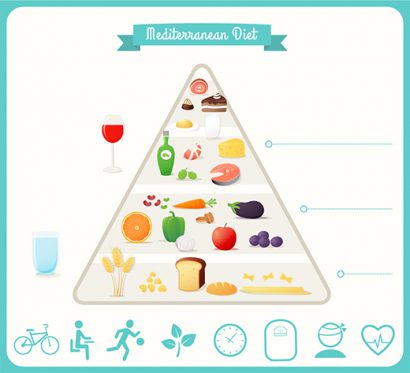Spotlight On: The Mediterranean Diet

Believe it or not, weight loss isn’t necessarily the ultimate goal of all diets. Certain “lifestyle diets” are focused more on promoting general health and wellbeing rather than simply helping you shed unwanted pounds (although weight loss can be and often still is a component). One such diet is known as the Mediterranean diet.

Concept: The Mediterranean diet is named for its focus on replicating the dietary lifestyle of the people in countries bordering the Mediterranean Sea. (Obvious enough, right?) People of the Mediterranean suffer from far fewer cases of heart disease and cancer than do most Americans, and therefore tend to live longer. Their diets emphasize whole grains, fruits, vegetables, legumes, healthy fats like olive oil and even red wine. (According to the Mayo Clinic, the average Greek eats upwards of six times more servings of antioxidant-rich fruits and vegetables than the average American does.) The Mediterranean diet also replaces salt with herbs and spices for flavoring, limits red meat consumption while emphasizing fish, and incorporates exercise and physical activity in conjunction with healthy eating. Unlike many other diets, the Mediterranean diet is not focused on weight loss, meaning that there are no caloric limitations or portion restrictions. Rather, it emphasizes balance and a very general idea of lifestyle health; which in turn can certainly aid weight loss, even if not the primary goal.
The Promise: Reduce your risk for serious chronic diseases like cancer, heart disease, Parkinson’s and Alzheimer’s. Lose weight and maintain a healthful lifestyle that can help you live longer and happier.
The Perils: There are few, if any, downsides to the Mediterranean diet. It promotes healthy, balanced eating that provides for all the necessary nutrients required for optimal nutrition. However, if quick, drastic weight loss is your primary goal, the Mediterranean diet is unlikely to provide you with the sort of “night-and-day” changes you’re looking for.
“Yes” Foods: Whole grains, fruits, vegetables, legumes, healthy fats, and spices and herbs serve as the basis for every meal. Fish, poultry, eggs, cheese and yogurt are not discouraged, but should be consumed more moderately. (A daily glass of red wine is absolutely encouraged.)
“No” Foods: Salt, butter, saturated fats and other processed “junk” foods should be avoided. Red meat should be limited to no more than a few servings per month.
Sample Meal: Dinner in the Med
Chicken kabobs – Grilled skinless white meat chicken breast (marinated in olive oil with pepper and lemon juice) served with grilled peppers and onions on pita bread with hummus.
Greek quinoa salad – Quinoa mixed with Kalamata olives, feta, cherry tomatoes and red onion, dressed with a lemon juice-infused olive oil and red wine vinaigrette.
Serve with a glass of red wine.
Should you or shouldn’t you? There are no known health-related downsides to the Mediterranean diet. It offers a balanced, heart-healthy approach to nutrition. Whether or not it is the right diet for you depends on what your dietary and lifestyle goals are. Speak with your doctor or a nutritionist to discuss your health and weight loss goals further.
Further Reading:
Mediterranean Diet Pyramid


